Back in 2002, during the FIFA World Cup, Korean stadiums were awash in a sea of red-shirted spectators. There was a giddy month-long national celebration as Korea's home team shattered all expectations and made it to the semi-finals of world soccer.
Amidst all this, considerable irony abounded, with partying fans wearing the Konglishy "Be the Reds!" t-shirts (irony because this nation-loving display had an inadvertent pro-communist message), and, after making a big deal about Korea's name going first in the
2002 Korea/Japan World Cup name, so many people were displaying banners, signs, etc., with
Korea spelled with a C: hence the signs rooting for
Corea.
Indeed, this Korea-versus-Corea spelling issue is something that
bubbles up from time to time. Most recently (as of this writing), a member of the National Assembly even
put forward a bill in 2003 to change the official spelling of the country's name to Corea. (The linked article refers to the "allegation that
Korea is a vestige of Japanese colonial rule over the nation.")
The K-v-C issue is not new. In fact, it has become a symbol of pride for uber-patriotic Koreans to label themselves
Corean and their homeland
Corea. Google yields 6.08 million hits for
Corea, 220,000 hits for
Corean, and 12,500 hits for
Corean-American in quotations (though google did ask, "Did you mean, 'Korean-American'?").
Corea is a badge of honor to wear in the fight against imperialistic and racist forces, both real and imaginary.
But I am getting ahead of myself. I am introducing a value judgment about the K-v-C issue without having first explained how I came to the realization/conclusion that this entire issue is hogwash. A red herring designed to whip up anti-Japanese sentiment.
The argument goes that Japanese authorities conspired to use their nation's power in order to change Korea's traditional spelling of
Corea to
Korea so that Japan would come before Korea in any international forum.
Indeed, it is an irrefutable fact that
Korea was at one time spelled as
Corea, largely because of French influence in the 19th century. The usage of
Corea is an indisputable part of the historic record, with numerous official items showing the official and unofficial spelling of
Corea. Sometime in the late 19th century and early 20th century, however, both official Korean usage and unofficial usage clearly came to favor
Korea.
That Japan was behind the spelling change in order to come out ahead of Korea is an interesting hypothesis, but it is full of holes in the form of logic and fact. The story is verifiably false for the following reasons:
1. No one has ever been able to come up with hard, conclusive evidence that such conscious decisions were ever made.
When the Japanese government denied official involvement in the mobilization of
Comfort Women during World War II, historians combed through document after document to prove them wrong. Japanese historians xxx and xxx found the evidence to show that the Japanese government's denial of official sanction was a lie.
If the Japanese still had records that would implicate the government in something so heinous as the creation and mobilization of the Comfort Women corps, it would stand to reason that the decision to change
Corea to
Korea would be documented somewhere, too. Yet it has not turned up.
The member of the ROK National Assembly who proposed in 2003 that Korea be changed to Corea does say he has seen a document indicating that Japanese officials complained of Koreans using "Corea" to spell the country's name, which was seen as a sign of nationalism. I have not seen this, but it may well have been that the official was complaining of Koreans not using Chosen, the Japanese pronunciation of Choson, not that he was complaining of Korean spelling. This is purely speculative on my part, but well grounded. Nevertheless, you will see that this is not relevant.
Link to Barbara Demmick article on K-v-C issue, which includes mention of the apocryphal story (my description, not hers) that Japan changed the spelling in time for the 1908 Olympics in London. Note that the Korean Olympic Committee was formed in 1946, before the Republic of Korea was officially established, and in time for the 1948 Olympics when Korea made its Olympic debut (South Korea also participated in the 1952 Olympics in Helsinki, despite the Korean War raging at the time). Simply put, Korea was not one of the 22 countries that participated in the 1908 London Olympiad.
Of course, the lack of such records is not at all irrefutable evidence. Arguably, it is not evidence at all, since there could be a whole host of reasons why a document may exist (or once existed) but hasn't turned up. Fortunately, this is the weakest piece of evidence why the Korea-versus-Corea issue is nothing more than a red herring. I only mention it because it is the first sign that the pro-Corea argument simply doesn't hold water.
2. As ruler over a Korea that had been absorbed into Japan, there would be no reason for Japan to be concerned with how Korea's name appeared in international forums.
Sohn Kee-chung (Son Kijŏng), known as Kitei Son in Japanese.
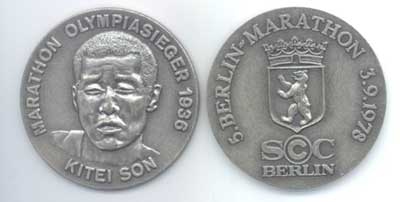 1930s medal commemorating Olympic marathon gold medalist Kitei Son (the Japanese pronunciation of Son Kijŏng), an ethnic Korean who, as a Japanese citizen, participated on behalf of Japan. His English name is officially spelled Sohn Kee-chung.
3. The name Korea was used in official government materials long before the Japanese took over Korea.
1930s medal commemorating Olympic marathon gold medalist Kitei Son (the Japanese pronunciation of Son Kijŏng), an ethnic Korean who, as a Japanese citizen, participated on behalf of Japan. His English name is officially spelled Sohn Kee-chung.
3. The name Korea was used in official government materials long before the Japanese took over Korea.
stamps (although Japanese helped make them)
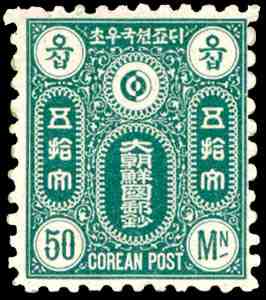 1884 Korean stamp labeled as Corean Post.
1884 Korean stamp labeled as Corean Post.
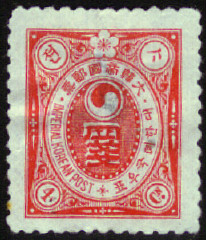 1900 stamp from Imperial Korean Post.
1900 stamp from Imperial Korean Post.
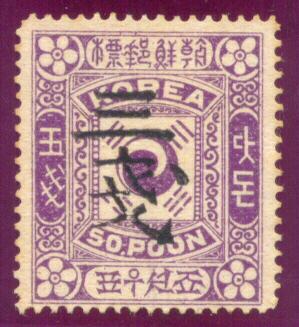 Chosŏn imperial-era 50-poon stamp identifying country as Korea.
Chosŏn imperial-era 50-poon stamp identifying country as Korea.
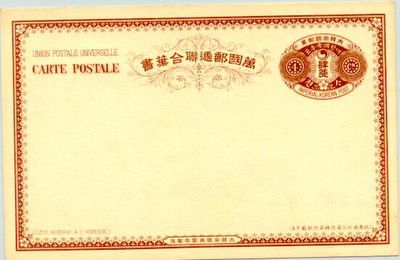 Postcard issued by Imperial Korean Post.
Postcard issued by Imperial Korean Post.
passports
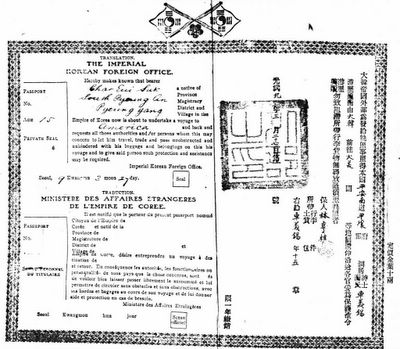 Imperial Korean passport issued by The Imperial Korean Foreign Office.
Imperial Korean passport issued by The Imperial Korean Foreign Office.
This evidence is not new. In fact, pro-
Coreans counter this argument by pointing out that Japanese influence in Korea was strong well before 1910 when Japan annexed Korea, and even before 1904 when Japan began plans in earnest to not just control Korea but absorb it into Japan. Going back to Japan's 1895 victory over China in the
Sino-Japanese War, the Japanese government and Japanese individuals had been exerting considerable influence on Korea's politics and its economy.
That is why exhibit #4 is rather important.
4. The Japanese authorities continued to use Chōsen or the Corea spelling during their rule of Korea.
This is where my argument goes beyond that of most others who have debunked the
Corea myth. The ultimate way of demonstrating that the Japanese authorities were not behind the
Korea spelling for any kind of malicious alphabetic purpose is that they continued to refer to Korea using two spellings that begin with
C.
Chōsen, for those of you who are not aware, is the Japanese pronunciation of 朝鮮, the Chinese characters that represent
Chosŏn (
Joseon in the atrocious NAKL writing system) the name of the Korean kingdom (1392-1910) begun by Yi Sŏnggye (later King T'aejo) at the end of the 14th century. The Japanese continued to use 朝鮮 to refer to Korea, as do the North Koreans even today (although the North Koreans tend to write it in Korean script, 조선).
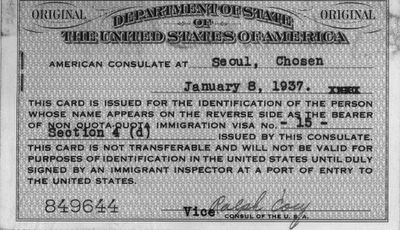 1937 "green card" (U.S. alien registration card) of Japanese national listing Chosen as country of birth.
1937 "green card" (U.S. alien registration card) of Japanese national listing Chosen as country of birth.
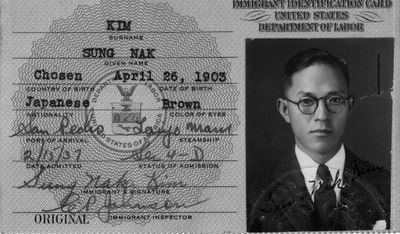 The same U.S. Immigrant Identification Card of ethnic Korean of Japanese nationality showing country of birth as Chosen.
The same U.S. Immigrant Identification Card of ethnic Korean of Japanese nationality showing country of birth as Chosen.
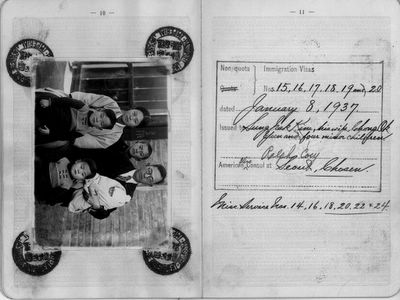 Imperial Japanese passport with U.S. visa stamp issued by American Consul at Seoul, Chosen.
Imperial Japanese passport with U.S. visa stamp issued by American Consul at Seoul, Chosen.
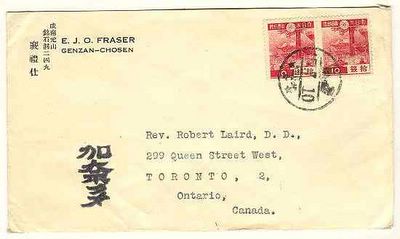 1939 postcard with Chosen stationery.
1939 postcard with Chosen stationery.
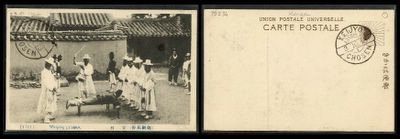 Japanese occupation-era postcard with Keijyo, Chosen postmark (Keijyo, a later alternate spelling of Keijō, is the Japanese pronunciation of Kyŏngsŏng, or 京城 , the Japanese name for Seoul).
Japanese occupation-era postcard with Keijyo, Chosen postmark (Keijyo, a later alternate spelling of Keijō, is the Japanese pronunciation of Kyŏngsŏng, or 京城 , the Japanese name for Seoul).
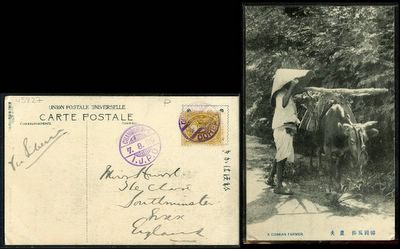 Japanese occupation-era postcard with Corea in postmark.
Japanese occupation-era postcard with Corea in postmark.
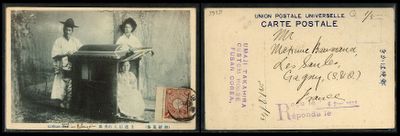 Japanese occupation-era postcard with Custom House stamp issued by Umaji Takahira at Fusan, Corea (Fusan is the Japanese pronunciation of Pusan).
Japanese occupation-era postcard with Custom House stamp issued by Umaji Takahira at Fusan, Corea (Fusan is the Japanese pronunciation of Pusan).
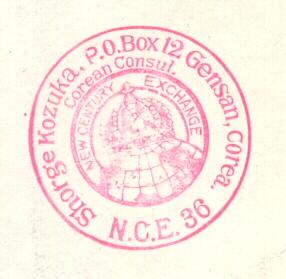 Japanese consul stamp from Kensan, Corea.
Japanese consul stamp from Kensan, Corea.
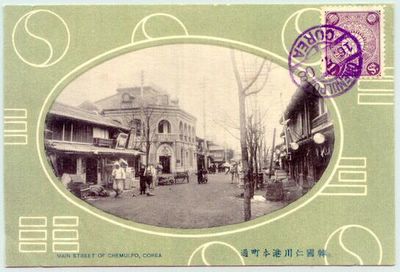 Postcard of Chemulpo, Corea with postmark from Chemulpo, Corea (Chemulp'o is the older name of port area in modern-day Inch'ŏn).
Postcard of Chemulpo, Corea with postmark from Chemulpo, Corea (Chemulp'o is the older name of port area in modern-day Inch'ŏn).
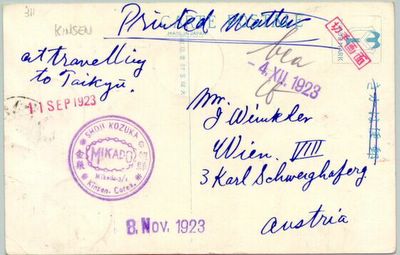 1923 postcard postmarked from Kinsen, Corea (Kinsen is the Japanese pronunciation of Inch'ŏn).
To sum up
1923 postcard postmarked from Kinsen, Corea (Kinsen is the Japanese pronunciation of Inch'ŏn).
To sum up:
1. There is zero solid, documentary evidence that Japan officialdom ever set out to change Corea's spelling to Korea.
2. Having absorbed Korea, Japan would have no need to worry about whether Korea would come above it or below it in an international forum.
3. Korea's royal and imperial governments began using the Korea spelling before Japan started wielding sufficiently hefty influence over Korea around 1904.
4. The Japanese continued to spell Korea's name with a C (as Chōsen or Corea) when they controlled Korea.
The evidence is clear for anyone who wants to look into it. This is all the more reason it is so irresponsible for organizations and companies to jump on the
Corea bandwagon: they are unwittingly buying into an argument exists to promote animosity toward another country.
It is also true that some, such as the artist linked here, feel that even if it is not true that the Japanese imposed the
Korea spelling, the
Corea spelling "represents the lost memories of a pre-occupation pre-war unified Corea, without North and South, without a communism versus freedom connotation. At the very least, it gets people to ask why I spell it like that and learn a little about Corean history, even if they disagree or do not care."
That may be fine, but what kind of history are they learning? The
Corea spelling as a modern issue is inextricably tied to attempts to whip up animosity against another country.
And what exactly does
Corea hearken back to? It was the spelling of the country when its people were suffering under the weight of a corrupt and oppressive monarchy that was often unable or unwilling to meet the challenges of a new era, which helped Korea become swallowed up by Japan.
Please don't get me wrong, a great deal of horrific things happened at the hands of imperial Japan prior to 1945. And it can be argued that modern-day Japan's current leadership is not facing up to that legacy with the genuine contrition that would be needed for Japan to move forward with the countries it once invaded, occupied, and brutalized. But I feel that the
actual atrocities of occupation, forced labor, mobilization of the Comfort Women sex slaves, etc., are
enough by themselves to make Koreans take pause when regarding Japan
without making up new insults and injuries.
If anything,
these fabrications diminish what has actually happened to real people at the hands of the Japanese. It is an insult to the Comfort Women and the forced laborers, for example, because it says to those people, "Sorry, but your
actual suffering is not enough for us to whip up anger against Japan, so we have to make stuff up."
...


































